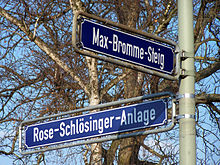Rose Schlösinger
Rose Schlösinger (born October 5, 1907 in Frankfurt am Main , † August 5, 1943 in Berlin-Plötzensee ) was a German resistance fighter . She was a member of the Red Orchestra .
Life
Like her mother Sophie Schlösinger, Rose Schlösinger got involved politically and socially at an early age. She was u. a. Member of the Socialist Workers Youth . From 1924 to 1926 she trained as a kindergarten teacher, and from 1929 began studying career counseling and youth care. In 1932 their daughter Marianne was born, who came from a short marriage with the teacher Friedrich Heinemann . In 1933, Rose Schlösinger was dismissed from an internship as the daughter of a politically unreliable woman and was temporarily unemployed . She later worked as a secretary. In 1939 she married her cousin Bodo Schlösinger , translator for Polish and Russian , and in the same year they moved to Berlin. From 1940 she and her husband took part in the meetings around Arvid Harnack and Karl Behrens . During this time, her husband was used as a translator in Poland and later in Russia , where he witnessed the murder of Russian civilians. Rose Schlösinger worked from 1942 as a transmitter of information within the resistance group. She was arrested on September 19, 1942 and sentenced to death on January 20, 1943 for espionage . Her petition for clemency was rejected by Adolf Hitler . On August 5, 1943, she was executed with the guillotine in Berlin-Plötzensee prison.
Her husband had already committed suicide at the front on February 22, 1943 after learning of his wife's death sentence.
Farewell letter
Shortly before her execution, Rose Schlösinger wrote a farewell letter to her daughter Marianne:
"And then you should have children - if you put your first child in your arms, you might think of me, that it was also a highlight of my life when I held you little red bundle for the first time and then think about the evenings , when we talked in bed about the many important things in life - I tried to answer your questions - and think of the wonderful three weeks at the sea - of the sunrise, and when we walked barefoot from Bansin to Ückeritz on the beach, and when I drove you on the hose in front of me, and when we read books together - we had so many beautiful things together, my child, you should experience it all again and much more. And I want to tell you one more thing: When you have to die, you feel sorry for every bad word that you have given to a loved one; if one were allowed to go on living, one would remember that and control oneself much better. Maybe you can remember that - you make life easier for yourself and others, and later also death.
And be happy as often as you can - every day is precious, it is a shame for every minute that has been spent sad.
My love for you should accompany you all your life. - I kiss you - and everyone who is nice to you. Farewell my dear - to the end
your mom thinks of you with the greatest love "
Honors
Rolf Hochhuth based his Antigone adaptation, Die Berliner Antigone , published in 1963, on the fate of Rose Schlösinger. The novella is preceded by the dedication to Marianne , the daughter of Rose Schlösiniger and Hochhuth's first wife.
In Rose Schlösinger's hometown of Frankfurt am Main, a bronze plaque with her portrait in her memory is attached to her former home at Münzenbergerstrasse 4.
The park on Bornheimer Hang in Frankfurt-Bornheim is also named after Rose Schlösinger .
On September 1, 2018 , stumbling blocks for her and Bodo Schlösinger were laid at their former place of residence, Berlin-Mitte , Sebastianstraße 42 .
Web links
literature
- Regina Griebel, Marlies Coburger, Heinrich Scheel : Recorded? The Gestapo album for the Red Orchestra. A photo documentation . Audioscop, Halle 1992, ISBN 3-883-84044-0 .
- Brigitte Oleschinski : Plötzensee Memorial . 2nd Edition. German Resistance Memorial Center, Berlin 1995, ISBN 3-926082-05-4 , (PDF; 142 kB)
- Luise Kraushaar among others: German resistance fighters 1933–1945. Biographies and letters. Volume 2. Dietz-Verlag, Berlin 1970, pp. 552f.
Individual evidence
- ↑ a b Rose Schlösinger: Courageous resistance fighter Frankfurt (Main) 1933-1945
- ^ Rose Schlösinger: Farewell letter . In: Helmut Gollwitzer , Kathe Kuhn, Reinhold Schneider (eds.): You haunted me at night. Farewell letters and records of the resistance from 1933 to 1945 . Kaiser, Munich 1954, DNB 451613341 , p. 255 f . (Quoted from Sigrid Chamberlain: Adolf Hitler, the German mother and her first child. About two Nazi educational books (= Psychosozial edition). Psychosozial-Verlag, Giessen 1997, ISBN 3-930096-58-7 , p. 188).
- ^ City of Frankfurt am Main - Citizens' Registration Office, Statistics and Elections: Street directory Frankfurt am Main, 23rd edition, 2019 , accessed on February 9, 2020
| personal data | |
|---|---|
| SURNAME | Schlösinger, Rose |
| BRIEF DESCRIPTION | German resistance fighter |
| DATE OF BIRTH | October 5, 1907 |
| PLACE OF BIRTH | Frankfurt am Main |
| DATE OF DEATH | August 5, 1943 |
| Place of death | Berlin-Plötzensee |

